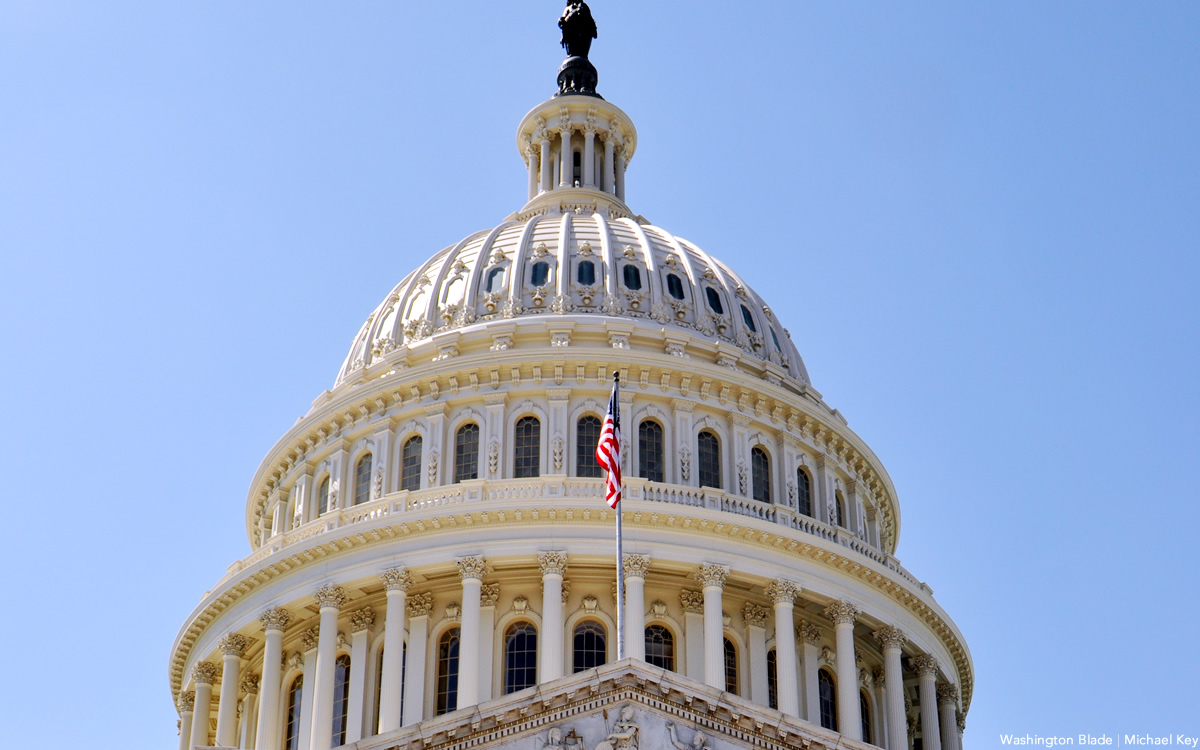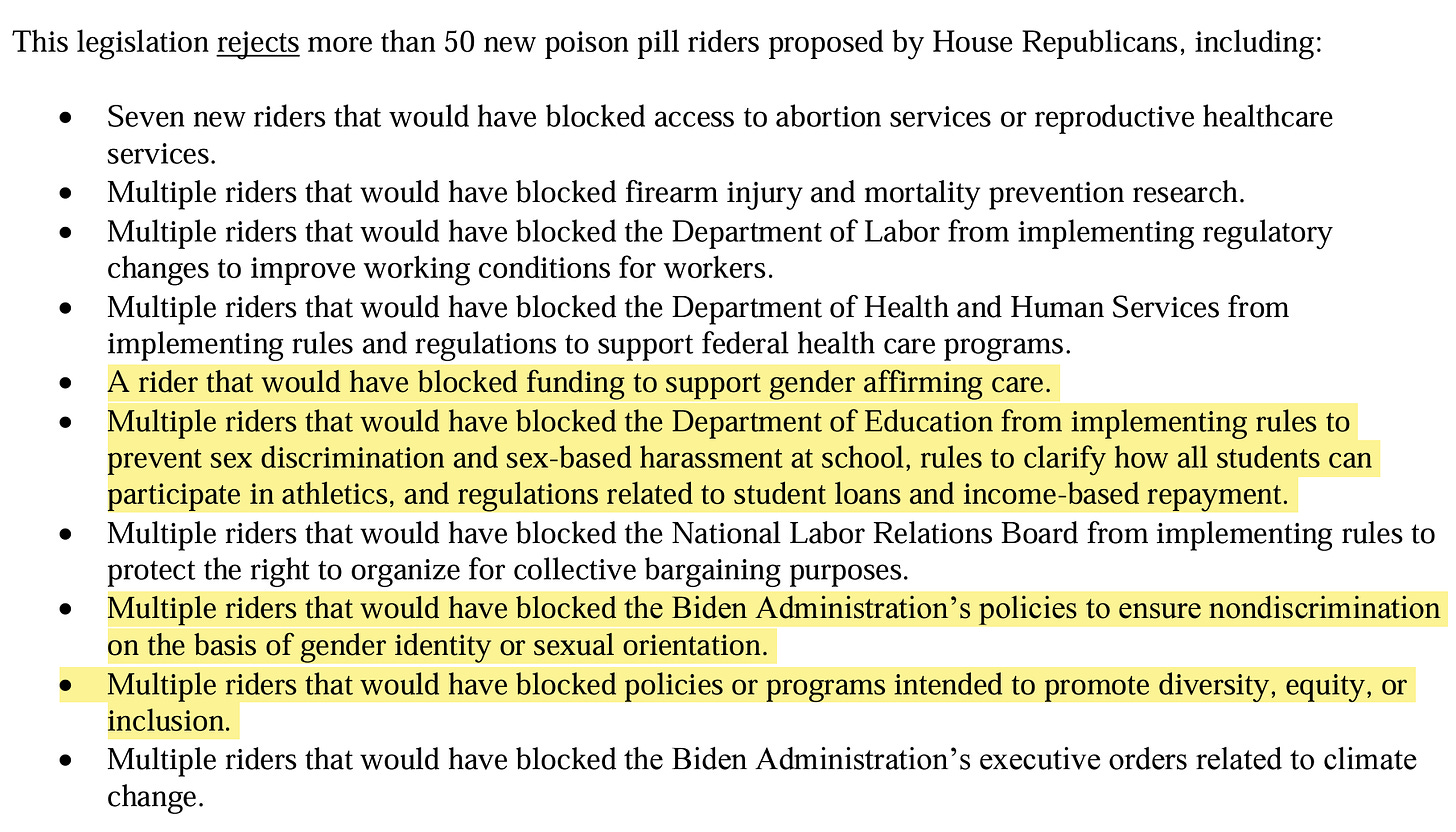Congress
Democratic lawmakers reintroduce ‘lavender scare’ firings review bill
Thousands of LGBTQ federal government employees lost jobs during anti-communist purge

Three Democratic lawmakers on Thursday introduced a bill that seeks to rectify the harm caused to LGBTQ federal government employees who were fired during the so-called “lavender scare.”
“Today, as the United States confronts renewed threats to LGBTQI+ rights at home and abroad, we need to remember the far-reaching consequences of institutionalized homophobia,” said U.S. Rep. Joaquín Castro (D-Texas) in the statement that announced he and U.S. Reps. David Cicilline (D-R.I.) and Dina Titus (D-Nev.) introduced the Lavender Offense Victim Exoneration (LOVE) Act in the U.S. House of Representatives. “The so-called ‘lavender scare’ handed power to blackmailers and homophobes, stripped thousands of hard-working Americans of their jobs, and weakened our national security.”
The ‘lavender scare’, as it was called, saw the firing of thousands of gay employees throughout the federal government — particularly the State Department — from the 1940s to the 1960s as anti-communist sentiment raised suspicion toward certain minority groups in multiple spheres of American society.
The LOVE Act has been introduced before previous Congresses, including in both 2019 and 2020. While the bill in 2020 was also authored by Castro and Cicilline, U.S. Sen. Bob Menendez (D-N.J.) introduced the 2019 measure.
“It is long past time for the U.S. government to recognize the stories of the LGBTQI members of the State Department who were treated unfairly during the ‘lavender scare,’ and to offer them and their families a measure of justice,” Menendez said in a statement after introducing the 2019 bill.
In addressing what its sponsors identified as harm done to the LGBTQ community as a result of the ‘lavender scare,’ the newest LOVE Act proposes measures to be implemented within the State Department similar to those in previous forms of the bill.
Among its provisions, the bill would mandate the investigation of cases of those in the State Department targeted by the ‘lavender scare’ decades ago. In addition, the legislation would require the creation of an Advancement Board within the State Department to aid LGBTQ diplomats and their spouses both within the department as well as in their interactions with foreign countries.
On the congressional front, the bill would call for Congress to issue a formal apology for the role it played in the propagation of the ‘lavender scare.’
Subsequent bans on employment under the federal government for members of the LGBTQ community have made resurgences in the decades since the ‘lavender scare.’
The Obama administration in 2016 ended a ban on transgender Americans serving in the military that had been in place since the 1960s. The Trump administration reinstated the policy, but President Biden again reversed the ban within days of his inauguration.
“And what I’m doing is enabling all qualified Americans to serve their country in uniform, and essentially restoring the situation as it existed before, with transgender personnel, if qualified in every other way, can serve their government in the United States military,” Biden said.
Castro framed the proposed legislation as an important step toward both ensuring both reparation for the events of the ‘lavender scare’ as well as preventing such discrimination from occurring in the future.
“As we celebrate Pride Month, I’m proud to introduce the LOVE Act, which is an important step forward to address the harms of the ‘lavender scare’ and protect today’s State Department employees from discrimination,” Castro said.
Congress
Lawmakers champion drug policy reforms at National Cannabis Policy Summit
Congressional leaders pledged their support for decriminalization

Speaking at the 2024 National Cannabis Policy Summit on Wednesday, congressional leaders pledged their support for proposals to remedy the harms of America’s War on Drugs while protecting cannabis users and cannabis businesses that are operating under a fast-evolving patchwork of local, state, and federal laws.
Overwhelmingly, the lawmakers who attended the conference at the Martin Luther King Jr. Memorial Library in D.C. or delivered their remarks virtually were optimistic about the chances of passing legislative solutions in the near-term, perhaps even in this Congress.
Participants included U.S. Sens. Raphael Warnock (D-Ga.), Jeff Merkley (D-Ore.), Elizabeth Warren (D-Mass.), and Senate Majority Leader Chuck Schumer (D-N.Y.), along with U.S. Reps. Eleanor Holmes Norton (D-D.C.), Earl Blumenauer (D-Ore.), and Barbara Lee (D-Calif.), who co-chairs the Congressional Cannabis Caucus and was honored at the event with the Supernova Women Cannabis Champion Lifetime Achievement Award. Republicans included an aide for U.S. Rep. David Joyce (R-Ohio) who was featured in an afternoon panel discussion about the cannabis policy landscape on Capitol Hill.
Each of the members have long championed cannabis-related policy reforms, from Merkley’s SAFER Banking Act that would allow cannabis businesses to access financial services (thereby affording them the critically important protections provided by banks) to Lee’s work throughout her career to ameliorate the harms suffered by, particularly, Black and Brown communities that have been disproportionately impacted by the criminalization of marijuana and the consequences of systemic racism in law enforcement and the criminal justice system.
The lawmakers agreed America is now at an inflection point. Democratic and Republican leaders are coming together to support major drug policy reforms around cannabis, they said. And now that 40 states and D.C. have legalized the drug for recreational or medical use, or both, the congress members stressed that the time is now for action at the federal level.
Last summer, the U.S. Department of Health and Human Services issued a formal request to re-categorize marijuana as a Schedule III substance under the rules and regulations of the Controlled Substances Act, which kicked off an ongoing review by the Biden-Harris administration. Since the law’s enactment in 1971, cannabis has been listed as a Schedule I substance and, therefore, has been subject to the most stringent restrictions on and criminal penalties for its cultivation, possession, sale, and distribution.
Merkley acknowledged that re-scheduling would remedy the Nixon administration’s “bizarre” decision to house marijuana under the same scheduling designation as far more harmful and addictive drugs like heroin — and noted that the move would also effectively legalize biomedical research involving cannabis. However, the senator said, while re-scheduling “may be a step in the right direction, it’s not de-scheduling” and therefore would not make real inroads toward redressing the harms wrought by decades of criminalization.
Likewise, as she accepted her award, Lee specified that she and her colleagues are “working night and day on the legalization, not re-scheduling.” And her comments were echoed by Warren, who proclaimed in a prerecorded video address that “de-scheduling and legalizing cannabis is an issue of justice.”
Congressional Republicans have blocked legislation to legalize marijuana, the Massachusetts senator said, “and that is why the scheduling is so important,” as it might constitute a “tool that we can use to get this done without Republican obstruction.”
Warren, Merkley, and Schumer were among the 12 Senate Democrats who issued a letter in January to the U.S. Drug Enforcement Administration requesting transparency into its re-scheduling process while also, more importantly, demanding that the agency fully de-schedule cannabis, which would mean the drug is no longer covered by the Controlled Substances Act.
However, in a possible signal of political headwinds against these efforts, their Republican colleagues led by U.S. Sen. Mitt Romney (R-Utah) responded with a letter to DEA Administrator Anne Milgram “highlighting concerns over HHS’s recommendation to reschedule marijuana from a Schedule I to Schedule III-controlled substance.” The GOP signatories, all of whom serve on the Senate Foreign Relations Committee, also sought to “underscore the Drug Enforcement Administration’s (DEA) duty under the Controlled Substances Act (CSA) to ensure compliance with the United States’ treaty obligations under the Single Convention on Narcotic Drugs.”
As Norton noted during her prepared remarks, elected Democrats are not necessarily always on the same page with respect to expanding access to economic opportunity facilitated by cannabis. For instance, though President Joe Biden had promised, during his State of the Union address this year, to direct his “Cabinet to review the federal classification of marijuana, and [expunge] thousands of convictions for mere possession,” Norton blamed Biden along with House Republicans for provisions in the federal budget this year that prohibit D.C. from using local tax dollars to legalize cannabis sales.
A non-voting delegate who represents the city’s 690,000 residents in the House, Norton called the president’s position “deeply disappointing,” particularly considering his record of supporting “D.C. statehood, which would allow D.C. to enact its own policies without congressional interference” and grant its residents voting representation in both chambers of Congress. She added that the majority of Washingtonians are Black and Brown while all are held responsible for “the obligations of citizenship including paying federal taxes.”
Norton said the city should also have the power to grant clemency for crimes committed in the District, including cannabis-related crimes — power that, currently, can only be exercised by the president.
Some Republican lawmakers have been at the forefront of efforts to reform harmful cannabis regulations. For instance, a participant in a mid-afternoon panel pointed to the CURE Act, a bill introduced by U.S. Reps. Nancy Mace (R-S.C.) and Jamie Raskin (D-Md.) that would prohibit the federal government from denying security clearances based on applicants’ past or current use of cannabis.
While securing statehood for D.C. and de-scheduling cannabis via legislation or administrative action are perhaps, at least for now, a heavy lift, Merkley pointed to promising new developments concerning his SAFER Banking Act.
The Oregon senator first introduced the measure, then titled the SAFE Banking Act, in 2019, and he said the legislation’s evolution into its current iteration was difficult. “Regulators don’t want to be told what to do,” Merkley said, and negotiations with these officials involved “nitty-gritty arguments over every word.”
Pushback also came from one of Merkley’s Democratic colleagues. In September, Warnock, who is Georgia’s first Black U.S. senator, voted “no” on the 2023 version of the SAFER Banking Act, writing: “My fear is that if we pass this legislation, if we greenlight this new industry and the fees and the profits to be made off of it without helping those communities” most harmed by the War on Drugs “we will just make the comfortable more comfortable.”
Warnock’s statement followed his pointed remarks expressing concerns with the legislation during a Senate Banking Committee hearing.
“Let me be very clear,” he said, “I am not opposed to easing or undoing federal restrictions around cannabis. And I would support all of the provisions and reforms in this legislation if paired with broader cannabis reforms that substantively address the issue of restorative justice. This bill does not do that.”
At this point, however, the latest version of the SAFER Banking Act has advanced out of committee and earned the support of Senate leaders including Schumer and much of the Republican conference.
“This is the moment,” he said. “Let’s not let this year pass without getting this bill — the safer banking bill — through the House, through the Senate, and on the president’s desk.”
In her remarks, Lee also discussed the importance of business and industry-wide reforms like those in Merkley’s bill.
“We have to make sure that the cannabis industry is viewed by everyone, especially our federal government, as a legitimate business,” Lee said. “Legitimate, which deserves every single aspect of financial services that any legitimate business deserves and has access to.”
Like Warnock, the congresswoman also highlighted how these financial and business considerations intersect with “equity issues,” as “those who have been most impacted by this horrible War on Drugs” must “become first in line for the businesses and for the jobs and for the economic opportunity the cannabis industry provides.”
Reflecting on her experience introducing the Marijuana Justice Act in 2019, which was Congress’s first racial justice cannabis reform bill, Lee remembered how “everyone was like, ‘why are you doing this? It’s politically not cool.’” Her legislation sought to end the federal criminalization of marijuana, expunge the criminal records of those convicted of cannabis-related crimes, and reinvest in communities that have suffered disproportionately from the War on Drugs.
The congresswoman said she explained to colleagues how the bill addressed “many, many layers” of often-intersecting problems linked to federal cannabis policy, telling them: “This is a criminal justice issue, a racial justice issue, an issue of equity, a medical issue, a veterans’ issue, and an issue of economic security.”
Two years later, with a 220-204 vote, the House successfully passed the Marijuana Opportunity Reinvestment and Expungement Act, a comprehensive bill introduced by U.S. Rep. Jerry Nadler (D-N.Y.) and to the Senate by then-U.S. Sen. Kamala Harris (D-Calif.). The measure included Lee’s Marijuana Justice Act.
“This bill is the product of many, many years of advocacy for federal cannabis reform and equity,” she said in a statement celebrating the bill’s passage. “Make no mistake: This is a racial justice bill. It’s about the thousands of people of color who sit in jail for marijuana offenses while others profit. It’s about finally repairing the harms of the War on Drugs on communities and families across the country.”
“We’ve come a long way,” she told the audience on Wednesday. “And now we have a long way to go.”
Congress
House passes spending bill as Greene threatens to oust Johnson
51 of 52 anti-LGBTQ riders were defeated

The U.S. House of Representatives averted a government shutdown on Friday with a vote of 286-134 to pass the $1.2 trillion spending bill, over the objections of hard-right members like U.S. Rep. Marjorie Taylor Greene (R-Ga.).
The congresswoman subsequently filed a motion to remove House Speaker Mike Johnson (R-La.), who is himself an ultraconservative legislator. The move marked the second time in six months that the party has called for a vote to oust their own leader.
“Today I filed a motion to vacate after Speaker Johnson has betrayed our conference and broken our rules,” said Greene, who refused to say whether she would call up the resolution to call for a snap vote, which likely means the matter will be delayed until after the two-week recess.
Greene and Johnson are at odds over the content of the minibus appropriations package, with the congresswoman calling it a “Chuck Schumer, Democrat-controlled bill” that does not contain conservative policy demands on matters like immigration and LGBTQ issues.
The speaker, meanwhile, proclaimed, “House Republicans achieved conservative policy wins, rejected extreme Democrat proposals, and imposed substantial cuts while significantly strengthening national defense.”
With respect to anti-LGBTQ riders submitted by Republican members, more than 50 were ultimately stripped from the bill, which the Human Rights Campaign celebrated as “a victory,” crediting lawmakers for their “bipartisan, bicameral negotiations.”
Of the 52 anti-LGBTQ riders, only one survived in the $1.2 trillion package passed on Friday: A ban on flying Pride flags at U.S. embassies.
Congress
Massive defeat for anti-trans, anti-LGBTQ riders in spending bill
Proposal has only one rider that would target community

On Thursday, Congress unveiled the much-anticipated spending bill to avert a government shutdown. The bill, which includes funding for major government departments such as Health and Human Services and Education, featured fierce negotiations over conservative “policy riders.”
These policy riders included bans on coverage for gender-affirming care, DEI bans, sports bans and more. Despite some indications that Democrats might compromise due to the sheer number of conservative policy riders, it appears those fears did not come to fruition. Democrats held firm in negotiations, and the most impactful anti-trans and anti-LGBTQ riders were nowhere to be found.
One policy rider proposed for the Food and Drug Administration would have defunded any hospital that “distributes, sells or otherwise uses drugs that disrupt the onset of puberty or sexual development for those under 18,” a measure targeting not only transgender youth but also those experiencing precocious puberty.
Another rider sought to bar any government funding toward “surgical procedures or hormone therapy for the purposes of gender-affirming care” in the Department of Health and Human Services. This move would have significantly impacted private and subsidized insurance in the Healthcare Marketplace. It also aimed to bar the enforcement of President Joe Biden’s executive order titled “Preventing and Combating Discrimination on the Basis of Gender Identity,” which broadened anti-discrimination protections for trans individuals.
Additional riders included bans on funding for any organization that “promotes transgenderism,” Title IX protections for trans youth, bans on legal challenges against states over anti-LGBTQ+ laws, book bans, DEI bans and more.
In total, over 40 riders were proposed and negotiated in the spending bills. None of these were found in the final bill.
Ultimately, the final spending bill released contained only a single anti-LGBTQ rider: A ban on Pride flags being raised or displayed above foreign embassies. The policy, while certainly qualifying as anti-LGBTQ and a regression to Trump-era policies, notably does not bar personal displays of Pride flags by embassy workers.
In the past, some embassies have gotten around such bans by not “flying a flag over the embassy” but rather, painting portions of the embassy in rainbow colors or draping flags on the side of buildings.
News of the defeat of the most impactful anti-trans and anti-LGBTQ riders comes after a significant push from Equality Caucus Democrats and the Biden administration against the riders. “As you negotiate government funding for Fiscal Year 2024 (FY24), we write to strongly urge you to reject any attempts to include anti-LGBTQ+ provisions in any final FY24 funding agreement,” said a letter signed by 163 representatives on behalf of the Congressional Equality Caucus to the Biden administration.
However, Republicans also pushed hard for their inclusion. In a shutdown threat issued Feb. 21 from the House Freedom Caucus, Republicans indicated that bans on gender affirming care and trans participation in sports were necessary to prevent a potential shutdown.
Previously, U.S. Dan Crenshaw (R-Texas) stated that such bans are the “hill we will die on.” In a report published by Axios, one Republican lawmaker stated, “People are predicting a shutdown even if it’s just for a few days.” Others concurred, citing gender affirming care riders as one of the potential reasons for such a shutdown.
Many anti-LGBTQ leaders in the Republican Party reacted negatively to the bill. U.S. Rep. Matt Gaetz (R-Fla.) expressed anger at funding for the New Jersey Garden State Equality in Education Fund, calling it “force feeding the LGBT agenda in schools” and stating that it enables “gender mutilation surgeries in minors,” “biological men” in women’s bathrooms and trans participation in sports.
U.S. Rep. Marjorie Taylor Greene (R-Ga.) decried the lack of a DEI ban. U.S. Rep. Andrew Clyde (R-Ga.) stated that Republicans “surrendered” to Democrats on hormone therapy. The House Freedom Caucus published a lengthy list of healthcare and equality centers that the budget would fund, urging the GOP to vote “no” and to shut down the government.
In a press release published by House Appropriations Democrats, they stated that the bill rejected over a hundred poison-pill riders, many of which targeted LGBTQ people. For example, the Labor-HHS-Education portion of the bill blocked provisions around gender affirming care, sports bans and nondiscrimination.
See the House Appropriations Democrats statement:
The bill must pass by Friday evening to avert a government shutdown, though the impacts of such a shutdown would likely not be felt until Monday. If passed, the bill would keep the government funded through September, at which point all of the riders could resurface during the peak of the 2024 presidential election.
However, for the next several months, LGBTQ riders will not pose a significant threat in a year where trans and queer individuals have faced attacks at historic levels.
****************************************************************************

Erin Reed is a transgender woman (she/her pronouns) and researcher who tracks anti-LGBTQ+ legislation around the world and helps people become better advocates for their queer family, friends, colleagues, and community. Reed also is a social media consultant and public speaker.
******************************************************************************************
The preceding article was first published at Erin In The Morning and is republished with permission.



















